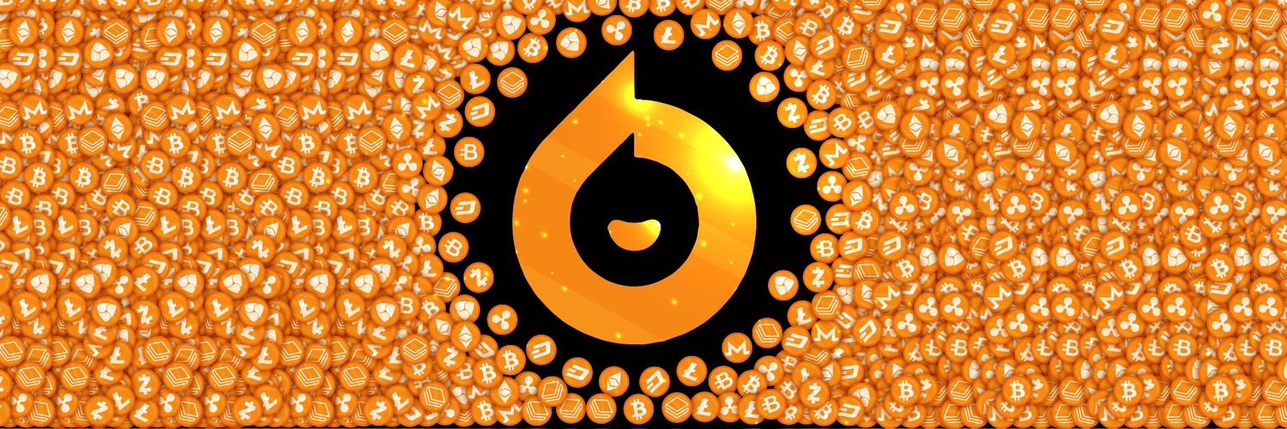Bitget: ติด 4 อันดับแรกตามปริมาณการเทรดรายวันทั่วโลก!
ส่วนแบ่งตลาด BTC63.46%
รายการลิสต์ใหม่บน Bitget : Pi Network
BTC/USDT$93875.10 (+3.26%)ดัชนีความกลัวและความโลภ72(โลภ)
ดัชนี Altcoin Season:0(Bitcoin Season)
เหรียญที่ลิสต์ใน Pre-MarketINITกระแสสุทธิของ Bitcoin Spot ETF ทั้งหมด: +$912.7M (1 วัน); +$1.31B (7 วัน)แพ็กเกจของขวัญต้อนรับสำหรับผู้ใช้ใหม่มูลค่า 6,200 USDTเคลมเลย
เทรดได้ทุกที่ทุกเวลากับแอป Bitget ดาวน์โหลดเลย
Bitget: ติด 4 อันดับแรกตามปริมาณการเทรดรายวันทั่วโลก!
ส่วนแบ่งตลาด BTC63.46%
รายการลิสต์ใหม่บน Bitget : Pi Network
BTC/USDT$93875.10 (+3.26%)ดัชนีความกลัวและความโลภ72(โลภ)
ดัชนี Altcoin Season:0(Bitcoin Season)
เหรียญที่ลิสต์ใน Pre-MarketINITกระแสสุทธิของ Bitcoin Spot ETF ทั้งหมด: +$912.7M (1 วัน); +$1.31B (7 วัน)แพ็กเกจของขวัญต้อนรับสำหรับผู้ใช้ใหม่มูลค่า 6,200 USDTเคลมเลย
เทรดได้ทุกที่ทุกเวลากับแอป Bitget ดาวน์โหลดเลย
Bitget: ติด 4 อันดับแรกตามปริมาณการเทรดรายวันทั่วโลก!
ส่วนแบ่งตลาด BTC63.46%
รายการลิสต์ใหม่บน Bitget : Pi Network
BTC/USDT$93875.10 (+3.26%)ดัชนีความกลัวและความโลภ72(โลภ)
ดัชนี Altcoin Season:0(Bitcoin Season)
เหรียญที่ลิสต์ใน Pre-MarketINITกระแสสุทธิของ Bitcoin Spot ETF ทั้งหมด: +$912.7M (1 วัน); +$1.31B (7 วัน)แพ็กเกจของขวัญต้อนรับสำหรับผู้ใช้ใหม่มูลค่า 6,200 USDTเคลมเลย
เทรดได้ทุกที่ทุกเวลากับแอป Bitget ดาวน์โหลดเลย



ราคา TreatTREAT
ไม่ได้ลิสต์
สกุลเงินอ้างอิง:
THB
ข้อมูลมีแหล่งที่มาจากผู้ให้บริการบุคคลที่สาม หน้านี้และข้อมูลที่ให้ไว้ไม่ได้เป็นการสนับสนุนคริปโทเคอร์เรนซีใดๆ โดยเฉพาะ ต้องการเทรดเหรียญที่ลิสต์ไว้ใช่ไหม คลิกที่นี่
฿0.006794+2.41%1D
ราคา
ตารางราคา Treat (TREAT/THB)
อัปเดตล่าสุดเมื่อ 2025-04-23 17:07:41(UTC+0)
มูลค่าตามราคาตลาด:--
Fully Diluted Market Cap:--
ปริมาณ (24 ชม.):--
ปริมาณ 24 ชม. / มูลค่าตามราคาตลาด:0.00%
สูงสุด 24 ชม.:฿0.006649
ต่ำสุด 24 ชม.:฿0.005976
All Time High:฿0.4193
All Time Low:฿0.{4}1784
อุปทานหมุนเวียน:-- TREAT
อุปทานทั้งหมด:
3,333,333,333TREAT
อัตราการหมุนเวียน:0.00%
อุปทานสูงสุด:
--TREAT
ราคาเป็น BTC:0.{8}2164 BTC
ราคาเป็น ETH:0.{6}1129 ETH
ราคาจากมูลค่าตามราคาตลาด BTC:
--
ราคาจากมูลค่าตามราคาตลาด ETH:
--
สัญญา:
0xfbd5...aaa146b(Ethereum)
เพิ่มเติม
คุณรู้สึกอย่างไรบ้างเกี่ยวกับ Treat ในวันนี้
หมายเหตุ: ข้อมูลนี้ใช้สำหรับอ้างอิงเท่านั้น
รายงานการวิเคราะห์ AI สำหรับ Treat
ไฮไลต์ตลาดคริปโตวันนี้ดูรายงาน
ราคา Treat วันนี้เป็น THB
ราคา Treat แบบเรียลไทม์วันนี้อยู่ที่ ฿0.006794 THB โดยมูลค่าตามราคาตลาดปัจจุบันอยู่ที่ ฿0.00 ราคา Treat ขึ้น 2.41% ในช่วง 24 ที่ผ่านมาและมีปริมาณการเทรด 24 ชั่วโมงอยู่ที่ ฿0.00 อัตราการแปลง TREAT/THB (Treat เป็น THB) อัปเดตแบบเรียลไทม์
ประวัติราคา Treat (THB)
ราคาของ Treat ปรับตัว -80.02% ในช่วงปีที่ผ่านมา ราคาสูงสุดของ เป็น THB ในปีที่แล้วอยู่ที่ ฿0.4193 และราคาต่ำสุดของ เป็น THB ในปีที่แล้วอยู่ที่ ฿0.003286
เวลาการเปลี่ยนแปลงราคา (%) ราคาต่ำสุด
ราคาต่ำสุด ราคาสูงสุด
ราคาสูงสุด 
 ราคาต่ำสุด
ราคาต่ำสุด ราคาสูงสุด
ราคาสูงสุด 
24h+2.41%฿0.005976฿0.006649
7d-21.33%฿0.005976฿0.009539
30d+31.08%฿0.004480฿0.01190
90d-49.44%฿0.003286฿0.01942
1y-80.02%฿0.003286฿0.4193
ตลอดกาล-75.27%฿0.{4}1784(2023-01-13, 2 ปีที่ผ่านมา )฿0.4193(2025-01-15, 99 วันที่ผ่านมา )
ราคาสูงสุดของ Treat คือเท่าไร
ราคา All Time High (ATH) ของ Treat เป็น THB คือ ฿0.4193 บันทึกไว้เมื่อ 2025-01-15 เมื่อเทียบกับ ATH ของ Treat แล้ว ราคาปัจจุบันของ Treat ลงอยู่ 98.38%
ราคาสูงสุดของ Treat คือเท่าไร
ราคา All Time Low (ATL) ของ Treat เป็น THB คือ ฿0.{4}1784 บันทึกไว้เมื่อ 2023-01-13 เมื่อเทียบกับ ATL ของ Treat แล้ว ราคาปัจจุบันของ Treat ขึ้นอยู่ 37984.78%
การคาดการณ์ราคา Treat
ราคา TREAT จะเป็นเท่าใดในปี 2026
จากโมเดลคาดการณ์ผลตอบแทนราคา TREAT ในอดีต คาดว่าราคา TREAT จะถึง ฿0.009511 ใน 2026
ราคา TREAT จะเป็นเท่าใดในปี 2031
ในปี 2031 ราคา TREAT คาดว่าจะเปลี่ยนแปลง +11.00% โดยภายในสิ้นปี 2031 ราคา TREAT คาดว่าจะแตะ ฿0.01565 และมี ROI สะสม +143.07%
คำถามที่พบบ่อย
ราคาปัจจุบันของ Treat คือเท่าไร
ราคาแบบเรียลไทม์ของ Treat อยู่ที่ ฿0.01 ตาม (TREAT/THB) โดยมีมูลค่าตามราคาตลาดปัจจุบันที่ ฿0 THB มูลค่าของ Treat เผชิญกับความผันผวนถี่เนื่องจากตลาดคริปโตมีการเคลื่อนไหวอย่างต่อเนื่องตลอด 24 ชั่วโมงทุกวัน สามารถดูราคาปัจจุบันแบบเรียลไทม์และข้อมูลย้อนหลังของ Treat ได้ที่ Bitget
ปริมาณการเทรด 24 ชั่วโมงของ Treat คือเท่าไร
ในช่วง 24 ชั่วโมงที่ผ่านมา ปริมาณการเทรดของ Treat คือ ฿0.00
All Time High ของ Treat คือเท่าไร
All Time High ของ Treat คือ ฿0.4193 All Time High คือราคาสูงสุดสำหรับ Treat นับตั้งแต่เปิดตัวมา
ฉันสามารถซื้อ Treat บน Bitget ได้หรือไม่
แน่นอน เพราะ Treat พร้อมให้บริการแล้วบนแพลตฟอร์มแลกเปลี่ยนแบบรวมศูนย์ (Centralized Exchange) ของ Bitget สำหรับรายละเอียดการใช้งานเพิ่มเติม โปรดอ่านที่คู่มือ “วิธีซื้อ treat ” ของเรา
ฉันสามารถรับรายได้คงที่จากการลงทุนใน Treat ได้ไหม
แน่นอน! Bitget ให้บริการ แพลตฟอร์มเทรดเชิงกลยุทธ์ พร้อมบอทเทรดอัจฉริยะเพื่อให้คุณเทรดและทำกำไรได้โดยอัตโนมัติ
ฉันจะซื้อ Treat ด้วยค่าธรรมเนียมต่ำที่สุดได้จากที่ไหน
เรายินดีที่จะประกาศว่า แพลตฟอร์มเทรดเชิงกลยุทธ์ พร้อมให้บริการแล้วบนแพลตฟอร์มแลกเปลี่ยน Bitget Bitget มีค่าธรรมเนียมการเทรดและความลึกของตลาดระดับแนวหน้าในวงการ เพื่อการันตีว่านักเทรดจะได้รับผลกำไรจากการลงทุน
ยอดถือครอง Treat ตามการกระจุกตัว
วาฬ
นักลงทุน
รายย่อย
Treat Address ตามระยะเวลาถือครอง
ผู้ถือ
นักท่องเที่ยว
นักเทรด
กราฟราคา coinInfo.name (12) แบบเรียลไทม์

ราคา Treat ทั่วโลก
ตอนนี้ Treat มีมูลค่าเท่าไรในสกุลเงินอื่น อัปเดตล่าสุด: 2025-04-23 17:07:41(UTC+0)
TREAT เป็น MXN
Mexican Peso
Mex$0TREAT เป็น GTQGuatemalan Quetzal
Q0TREAT เป็น CLPChilean Peso
CLP$0.19TREAT เป็น HNLHonduran Lempira
L0.01TREAT เป็น UGXUgandan Shilling
Sh0.74TREAT เป็น ZARSouth African Rand
R0TREAT เป็น TNDTunisian Dinar
د.ت0TREAT เป็น IQDIraqi Dinar
ع.د0.27TREAT เป็น TWDNew Taiwan Dollar
NT$0.01TREAT เป็น RSDSerbian Dinar
дин.0.02TREAT เป็น DOPDominican Peso
RD$0.01TREAT เป็น MYRMalaysian Ringgit
RM0TREAT เป็น GELGeorgian Lari
₾0TREAT เป็น UYUUruguayan Peso
$0.01TREAT เป็น MADMoroccan Dirham
د.م.0TREAT เป็น AZNAzerbaijani Manat
₼0TREAT เป็น OMROmani Rial
ر.ع.0TREAT เป็น SEKSwedish Krona
kr0TREAT เป็น KESKenyan Shilling
Sh0.03TREAT เป็น UAHUkrainian Hryvnia
₴0.01- 1
- 2
- 3
- 4
- 5
รายการลิสต์ใหม่บน Bitget
รายการลิสต์ใหม่
ซื้อเพิ่ม
จะซื้อคริปโตได้ที่ไหน
ส่วนวิดีโอ — ยืนยันฉับไว เทรดได้รวดเร็ว

วิธียืนยันตัวตนบน Bitget ให้เสร็จสิ้นและป้องกันตนเองจากการฉ้อโกง
1. เข้าสู่ระบบไปยังบัญชี Bitget ของคุณ
2. หากคุณเป็นผู้ใช้ใหม่ของ Bitget โปรดดูบทช่วยสอนของเราเรื่องวิธีสร้างบัญชี
3. ชี้เมาส์ไปที่ไอคอนโปรไฟล์ของคุณ จากนั้นคลิกที่ “ไม่ได้รับการยืนยัน / Unverified” แล้วคลิก “ยืนยัน / Verify”
4. เลือกประเทศหรือภูมิภาคที่ออกและประเภทเอกสารระบุตัวตนของคุณ แล้วทำตามขั้นตอนที่ปรากฏ
5. เลือก “การยืนยันทางโทรศัพท์มือถือ / Mobile Verification” หรือ “PC” ตามต้องการ
6. ป้อนรายละเอียดของคุณ ส่งสำเนาเอกสารระบุตัวตน และถ่ายภาพเซลฟี
7. ส่งใบสมัครของคุณ เท่านี้ก็เรียบร้อย คุณเสร็จสิ้นการยืนยันตัวตนแล้ว!
การลงทุนในคริปโทเคอร์เรนซี รวมถึงการซื้อ Treat ออนไลน์ผ่าน Bitget นั้นอยู่ภายใต้ความเสี่ยงในตลาด Bitget พร้อมให้บริการวิธีที่ง่ายดายและสะดวกสำหรับซื้อ Treat และเราจะพยายามอย่างสุดความสามารถเพื่อให้ข้อมูลผู้ใช้เกี่ยวกับคริปโทเคอร์เรนซีแต่ละรายการที่เรามีให้บริการบนแพลตฟอร์ม อย่างไรก็ตาม Bitget จะมิได้มีส่วนรับผิดชอบต่อผลลัพธ์ที่อาจเกิดขึ้นจากการซื้อ Treat ของคุณ หน้านี้และข้อมูลที่อยู่ในหน้านี้ไม่ใช่การสนับสนุนคริปโทเคอร์เรนซีรายการใดรายการหนึ่งแต่อย่างใด
เรตติ้ง Treat
เรตติ้งโดยเฉลี่ยจากชุมชน
4.4
คอนเทนต์นี้มีจุดประสงค์เพื่อให้ข้อมูลเท่านั้น
Bitget Insights
samuelsammy
8ชม.
Would you buy more $EPT if it dipped 20% tomorrow?
Whether buying more $EPT on a 20% dip is smart depends on a few key factors, especially for a high-risk, high-reward token like this. Here’s how I’d approach the decision:
1. Has the Dip Broken the Narrative or Strengthened It?
If the 20% dip is due to general market pullback (BTC correction, macro FUD), and not project-specific issues, it’s often a buying opportunity. But if $EPT dropped because of dev drama, rug risk, or a failed roadmap update—that’s a red flag, not a dip worth buying.
2. Volume and Liquidity Reaction
If $EPT dips but volume increases and liquidity holds or rises, that suggests smart money is buying the dip. That’s bullish. But if volume dies and LPs pull out, it could mean confidence is eroding. In that case, waiting is safer.
3. On-Chain Accumulation
I’d check if top holders or wallets with good win-rates are accumulating during the dip. If whales are holding or buying more, I’d consider adding. If they’re dumping, I’d step back and reassess.
4. My Conviction Level and Entry Plan
If I already have high conviction in $EPT, a 20% dip is a discount. I’d scale in more, especially if I had dry powder ready for DCA. But I’d only double down if I believed the fundamentals (community, narrative, tokenomics) were intact.
Conclusion:
Yes, I’d consider buying more $EPT on a 20% dip—but only if the dip looks like an overreaction and the core story remains strong. I'd treat it as a tactical re-entry, not blind FOMO.
Want to analyze real-time holder flows or whale behavior for $EPT before deciding?
RED-2.55%
BTC+0.45%

Nusrat_Mim_CryptoQue
1วัน
FARTCOINUSDT – More Than Just A Meme?
Community Buzz:
FARTCOINUSDT might sound like a joke, but it’s riding a real wave of meme coin enthusiasm. Memes aren’t just for laughs anymore—they’re a force in DeFi and community-driven finance.
Strengths and Risks:
It’s backed by a fast-growing user base, and virality is on its side. But the fundamentals? Still unclear. That’s the paradox of meme tokens—momentum matters more than models.
Strategy Hint:
Great for high-risk short-term plays. It’s better to treat this like a rocket—ride it while it’s hot, but don’t forget a parachute.$FARTCOIN
FARTCOIN+1.94%
TREAT+4.77%

Bpay-News
1วัน
SignalPlus Macro Analysis Special Edition: The Times They Are a-Changin'
Trump’s second term is approaching its 100th day, but the geopolitical landscape has changed dramatically from just a few months ago. Correlations between assets are breaking down, capital flows are moving in opposite directions, and Bitcoin is (finally) starting to diverge from stocks. The president has even threatened to treat the Fed chair like a contestant on The Apprentice, while large U.S. endowments are dumping illiquid private equity assets at the industry’s most difficult time. Have we truly reached a critical turning point in financial history?
TREAT+4.77%
S+1.41%

smartcryptoglobal
1วัน
Bitcoin $btc vs ethereum $eth
Bitcoin vs Ethereum: A Comprehensive Analysis
Cryptocurrencies have emerged as a disruptive force in the financial world, yet understanding their nuances can be challenging, especially for newcomers. Among the vast landscape of digital assets, Bitcoin and Ethereum stand out as the two dominant players. Both leverage blockchain technology, but their underlying philosophies, use cases, and technological frameworks differ significantly. This analysis provides a deeper look into these two pioneering platforms, comparing their purposes, mechanisms, and potential future developments.
1. Purpose and Use Cases
Bitcoin (BTC): The Digital Gold
Launched in 2009 by an enigmatic figure, Satoshi Nakamoto, Bitcoin was envisioned as a peer-to-peer, decentralized digital currency. Its primary purpose is to serve as a store of value and a means of exchange in a world increasingly moving towards digital assets. Much like gold, Bitcoin's fixed supply—capped at 21 million coins—has positioned it as a hedge against inflation, economic instability, and traditional financial system vulnerabilities. Bitcoin is often seen as the digital gold of the cryptocurrency ecosystem, providing investors a relatively low-risk investment compared to other, more volatile digital assets.
Ethereum (ETH): The Decentralized Application Platform
Ethereum, conceptualized in 2013 and launched in 2015 by Vitalik Buterin and a group of other developers, transcends the idea of digital money. Ethereum introduces a decentralized platform where developers can build and deploy smart contracts and decentralized applications (dApps). This capability has led to the proliferation of a new generation of financial products, digital assets (like NFTs), and decentralized organizations. Ethereum's ecosystem supports a wide variety of applications, from Decentralized Finance (DeFi) to non-fungible tokens (NFTs), positioning it as a foundation for Web3 technologies.
2. Technology and Features
Bitcoin’s Simplicity and Security
Bitcoin was designed with simplicity and security in mind. The network is primarily focused on providing peer-to-peer transactions with a high degree of trustlessness. Bitcoin's scripting language, while secure, is intentionally limited in its functionality. This lack of complexity ensures fewer vulnerabilities, though it also restricts Bitcoin’s use cases beyond basic transactions. Bitcoin’s security model relies on the Proof of Work (PoW) consensus mechanism, where miners expend computational energy to secure the network and validate transactions.
Ethereum’s Flexibility and Smart Contracts
In contrast, Ethereum’s technology offers greater flexibility and programmability. Ethereum’s Solidity programming language enables the creation of sophisticated smart contracts, which are self-executing contracts with the terms directly written into code. This opens the door for Ethereum to support decentralized finance, decentralized applications, tokenization of assets, and the creation of NFTs. Ethereum’s broader functionality has cemented its role as the programmable blockchain of choice for developers and innovators. However, this flexibility comes at the cost of greater complexity and higher associated risks.
3. Supply and Inflation Dynamics
Bitcoin’s Fixed Supply
Bitcoin has a fixed supply of 21 million coins, a feature deliberately designed to combat inflation and prevent the devaluation of the currency. The scarcity of Bitcoin is central to its appeal as a store of value, akin to precious metals like gold. This fixed supply ensures that no new Bitcoin will be created once the final coins are mined, giving Bitcoin its deflationary properties. Additionally, its deflationary nature is further supported by the halving events that occur approximately every four years, reducing the rate at which new bitcoins are mined.
Ethereum’s Inflationary Supply Model
In contrast, Ethereum does not have a capped supply. Originally, this allowed for an unlimited issuance of new ETH, potentially leading to inflation. However, recent upgrades—such as the Ethereum 2.0 transition and the EIP-1559 proposal—have introduced mechanisms designed to control supply and potentially make ETH deflationary. Under Ethereum 2.0, the Proof of Stake (PoS) model reduces the issuance of new ETH, while the EIP-1559 burn mechanism permanently removes a portion of transaction fees from circulation, curbing inflation and potentially reducing the overall supply over time.
4. Transaction Speed and Costs
Bitcoin’s Slow Throughput
Bitcoin’s block time averages around 10 minutes, with a transaction throughput of approximately 7 transactions per second (TPS). This slow transaction speed can result in longer wait times and higher fees during times of network congestion. Bitcoin’s transaction costs fluctuate based on demand for block space, and users may face delays if there is insufficient space for their transaction in the next block.
Ethereum’s Higher Throughput and Scaling Challenges
Ethereum offers faster transaction speeds, with a block time of around 12-14 seconds and a throughput of 30 TPS. However, Ethereum has struggled with scalability issues, particularly during periods of high network activity, which results in high gas fees—the costs associated with executing smart contracts or making transactions on the network. Ethereum 2.0, which includes the transition to Proof of Stake and sharding, promises to significantly increase transaction throughput and lower costs, addressing many of these scalability concerns.
5. Consensus Mechanism
Bitcoin’s Proof of Work (PoW)
Bitcoin relies on the Proof of Work (PoW) consensus mechanism, in which miners compete to solve cryptographic puzzles to validate transactions and secure the network. While PoW is highly secure and has proven effective in preventing double-spending and attacks, it is also resource-intensive. Mining Bitcoin requires significant energy consumption, raising concerns about its environmental impact.
Ethereum’s Shift to Proof of Stake (PoS)
Ethereum’s shift to Proof of Stake (PoS) with Ethereum 2.0 represents a major departure from PoW. In PoS, instead of miners, validators are chosen to propose and validate new blocks based on the number of coins they hold and are willing to “stake” as collateral. PoS is significantly more energy-efficient and offers the potential for greater scalability, as it does not require intensive computational work to secure the network.
6. Investment Perspectives and Risk Profiles
Bitcoin: A Store of Value
Bitcoin is increasingly being viewed as a safe-haven asset in the cryptocurrency market. Its fixed supply, security, and history of price appreciation have positioned it as a digital store of value and a potential hedge against inflation. Many institutional investors and high-net-worth individuals treat Bitcoin as part of a diversified investment portfolio, alongside traditional assets like gold.
Ethereum: A Growth-Oriented Technology Platform
Ethereum, on the other hand, is seen more as a technology platform with higher growth potential but also higher risks. Its ability to support decentralized applications, smart contracts, and DeFi projects makes it an essential piece of the blockchain ecosystem. Ethereum's upcoming upgrades, particularly the full rollout of Ethereum 2.0 and its scaling solutions, are expected to enhance its performance and drive further adoption. However, the uncertainty surrounding the platform’s future, including potential competition from other smart contract blockchains, introduces a level of risk for investors.
Conclusion
Bitcoin and Ethereum are the cornerstone of the cryptocurrency ecosystem, each serving a distinct and crucial role. Bitcoin is the pioneer of decentralized money, focused on providing a secure, trustless means of transferring value and acting as a store of wealth. Ethereum, on the other hand, is a programmable platform that enables developers to build complex decentralized applications, offering a wide array of use cases beyond currency.
The two networks are not in direct competition but complement each other in the broader blockchain ecosystem. Understanding the unique features, advantages, and risks associated with both Bitcoin and Ethereum is essential for anyone looking to engage with the world of cryptocurrency—whether through investment, development, or exploration.
$BTC $ETH
BTC+0.45%
TREAT+4.77%

Gulshan-E-Wafa
1วัน
$FUN is Making FUN!!!
$FUN eyeing divergence here. If momentum indicators show strength against price weakness, this may become a rebound trade with edge.
---
I'm Focused on #FUN – Liquidations Deepen at $0.00583
For the second time, $FUN long traders faced the heat—$2.4997K in liquidations at $0.00583 confirm strong rejection and market imbalance.
---
Setup Outlook
Buy Entry: $0.00565 – $0.00578
TP1: $0.00615
TP2: $0.00645
Stop-Loss: Below $0.00555
---
Levels in Play
Support Floor: $0.00560
Resistance Barrier: $0.00620
The trend remains fragile. Until we reclaim $0.006, I’ll treat every bounce with caution.
---
Signal Watch
I'm looking for strong bid walls and sharp reversal candles on the 15-min chart. Without it? I stay sidelined.
TREAT+4.77%
สินทรัพย์ที่เกี่ยวข้อง
คริปโทเคอร์เรนซียอดนิยม
รายการคริปโทเคอร์เรนซีที่มีมูลค่าตามราคาตลาดสูงที่สุด 8 อันดับแรก
เพิ่มเมื่อเร็วๆ นี้
คริปโทเคอร์เรนซีที่เพิ่มเข้ามาล่าสุด
มูลค่าตามราคาตลาดที่เปรียบเทียบกันได้
ในบรรดาสินทรัพย์ Bitget ทั้งหมด 8 สินทรัพย์เหล่านี้มีมูลค่าตามราคาตลาดใกล้เคียงกับ Treat ที่สุด
ข้อมูลเพิ่มเติมเกี่ยวกับ Treat
ภาพรวมเหรียญ
ที่เกี่ยวข้องกับเหรียญ
ที่เกี่ยวข้องกับการเทรด
ข้อมูลอัปเดตเกี่ยวกับเหรียญ

































